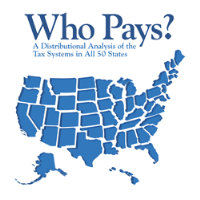State's Tax System Ranks Second-Fairest in the Nation, which Isn't Saying Much

California has an unjust state tax system that takes money from low- and middle-income families and gives it to the wealthy, according to the Institute on Taxation & Economic Policy, but it's doing great compared to the rest of the nation.
“Virtually every state tax system is fundamentally unfair,” according to the fifth edition of a report (pdf) by the Institute on Taxation & Economic Policy, but California ranks as the second fairest among the 50 states. “California has one of the least regressive tax systems due to its heavy reliance on a very progressive income tax,” the report released this month said.
The institute's measure of “fairness” is how evenly different income groups other than the elderly pay taxes as a percentage of their incomes. That includes local, state and federal income taxes, property taxes, and sales and excise taxes. The disparity has moral as well as economic consequences.
“Unfair tax systems not only exacerbate widening income inequality in the short term, but they also will leave states struggling to raise enough revenue to meet their basic needs in the long term,” the report argues. The trickle-down economics theory popularized in the '70s by President Reagan and conservative Republicans, although not nearly as popular among economists as it once was, still has a strong hold on state and national lawmakers who largely rely on wealthy individuals and corporations to fund their political campaigns.
A study (pdf) by Oxfam, also recently released, says the world's richest 1% will have more wealth than the other 99% combined by next year. Five years ago, the 1% controlled just over 44% of wealth; they are expected to hit 54% around 2020. Although the 1% have been victims of bad publicity—like when billionaire venture capitalist Tom Perkins ill-advisedly likened treatment of the 1% to Nazi persecution of Jews—they continue to control the nation's tax policies, while invoking a measure of sympathy as a persecuted minority (at least from Fox News).
There is no major figure in American politics today who employs the rhetoric President Franklin Roosevelt used during a time of income inequality that approached, but did not quite reach during the Depression, the level we have now. “These economic royalists complain that we seek to overthrow the institutions of America,” Roosevelt said in his 1936 acceptance of the Democratic Party's nomination for president. “What they really complain of is that we seek to take away their power. Our allegiance to American institutions requires the overthrow of this kind of power.”
President Obama's tax proposal unveiled last week would increase the capital gains tax rate and related inheritance taxes on the 1% but has virtually no chance of success in the Republican-controlled Congress. Defenders of the 1% have successfully thwarted reforms of the tax code by using arguments like the one Senator Orrin Hatch (R-Utah) made in response to Obama's proposal: “Slapping American small businesses, savers and investors with more tax hikes only negates the benefits of the tax policies that have been successful in helping to expand the economy, promote savings and create jobs.”
Obama's proposal affects only the 1% and four-fifths of them are among the richest one-tenth of the 1%.
California has managed to avoid that kind of inequitable tax policy on the state and local level by having a graduated personal income tax structure. But even in California, the lowest 20% (earning less than $23,000) pay a higher percentage of their income (10.5%) in taxes than the top 1% (making more than $569,000), who only pay 8.7%.
That's because the income-tax disadvantage for the top 1% is balanced out by big advantages in sales, excise and property taxes. Sales and excise taxes account for 6.8% of the lowest 20%'s income, compared to 0.8% for the super-wealthy. The lowest 20% also pay 3.6% of their income in property tax, compared to 1.6% among the 1%.
Every state, and the District of Columbia, has a regressive tax system, in that it takes a larger percentage of income from lower-income people. “Overall, effective state and local tax rates by income group nationwide are 10.9 percent for the bottom 20 percent, 9.4 percent for the middle 20 percent and 5.4 percent for the top 1 percent,” the report calculates.
Washington is the most regressive state. The poorest 20% pay 16.8%, compared to the top 1%'s 2.4%. That is an impressive ratio of 686% in favor of the rich. The middle 60% pay 10.1% for a ratio of 412%. Washington is followed by Florida, Texas, South Dakota, Illinois, Pennsylvania, Tennessee, Arizona, Kansas and Indiana.
Delaware is the most equitable tax state. The District of Columbia squeezes between it and California for equitable honors. The Top Ten states are rounded out by Oregon, Montana, Vermont, Minnesota, Maine, Idaho, West Virginia and New York.
–Ken Broder
To Learn More:
California Has the Second Fairest Taxes in the U.S. (by Dennis Romero, LA Weekly)
Who Pays? (Institute on Taxation & Economic Policy) (pdf)
- Top Stories
- Controversies
- Where is the Money Going?
- California and the Nation
- Appointments and Resignations
- Unusual News
- Latest News
- California Forbids U.S. Immigration Agents from Pretending to be Police
- California Lawmakers Urged to Strip “Self-Dealing” Tax Board of Its Duties
- Big Oil’s Grip on California
- Santa Cruz Police See Homeland Security Betrayal in Use of Gang Roundup as Cover for Immigration Raid
- Oil Companies Face Deadline to Stop Polluting California Groundwater





